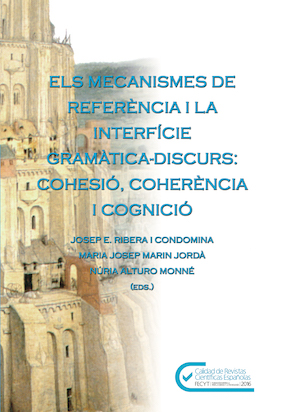Sobre el lligam sintàctic de variables i la relació de c-comandament
DOI:
https://doi.org/10.7203/qf.23.13529Paraules clau:
teoria del lligam clàssica, correferència, lligam de variables, interfície sintaxi-semàntica-pragmàtica Resum
Resum
Aquest article se centra en un aspecte central en la investigació de la interfície sintaxi-semàntica-pragmàtica: les relacions anafòriques. Més concretament, presenta una selecció dels problemes que plantegen les relacions anafòriques per a la teoria clàssica del lligam de Chomsky (1981), de naturalesa eminentment sintàctics, i per a la versió de Huang (2007) del model pragmàtic neogriceà de l’anàfora, inicialment proposat per Levinson (1987, 1989). Més enllà de l’enumeració dels interessants problemes que plantegen les relacions anafòriques per als diferents marcs teòrics, destaquem la necessitat d’integrar factors sintàctics, semàntics i pragmàtics a l’hora de construir un model teòric de l’anàfora que sigui més adequat.
 Descàrregues
Descàrregues
Descàrregues
Publicades
Com citar
-
Resum573
-
PDF382
Número
Secció
Llicència
 Este obra está bajo una licencia de Creative Commons Reconocimiento-NoComercial-SinObraDerivada 4.0 Internacional.
Este obra está bajo una licencia de Creative Commons Reconocimiento-NoComercial-SinObraDerivada 4.0 Internacional.
Tots els documents inclosos a OJS són d'accés lliure i propietat dels seus autors i/o institucions editores, i per tant, qualsevol acte de reproducció, comercialització, comunicació pública o transformació total o parcial necessita el consentiment exprés i escrit d'aquests.
Authors who publish with this journal agree to the following terms:
- Authors retain copyright and grant the journal right of first publication with the work simultaneously licensed under a Creative Commons Attribution License that allows others to share the work with an acknowledgement of the work's authorship and initial publication in this journal.
- Authors are able to enter into separate, additional contractual arrangements for the non-exclusive distribution of the journal's published version of the work (e.g., post it to an institutional repository or publish it in a book), with an acknowledgement of its initial publication in this journal.
- Authors are permitted and encouraged to post their work online (e.g., in institutional repositories or on their website) prior to and during the submission process, as it can lead to productive exchanges, as well as earlier and greater citation of published work (See The Effect of Open Access).



